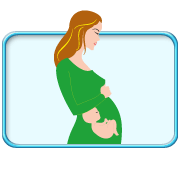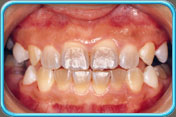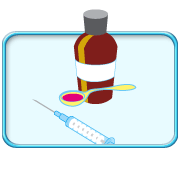Queries of the Expectant Mothers
Would the foetus absorb calcium from the mother's teeth and make them weaker?
The foetus does not absorb calcium from the mother's teeth. The calcium of the foetus
comes mainly from the mother's bones and to a lesser extent, from her normal diet.
Hence, her teeth could not be weakened because of her foetus. However her teeth
may be weakened because most expectant mothers fall into a habit of frequent snacking
in between meals and this habit causes tooth decay.

Would medication during pregnancy affect the tooth development of the foetus?
From the 5th to 6th week of pregnancy, teeth begin to develop in the foetus. If
the expectant mother takes tetracycline during pregnancy, the teeth of the foetus
may be affected and become discoloured. Hence she has to tell the doctor that she
is pregnant, so that the doctor will take care in prescribing the appropriate medication
if necessary.

What should be done when expectant mothers suffer from a painful wisdom tooth? If
tooth extraction is needed, would the anaesthesia affect the foetus?
The first three months of pregnancy is an important development stage for the foetus.
To avoid possible risks cause by dental treatment, dentists usually suggest to put
off dental treatments until the 4th to 6th month of pregnancy, and the non-urgent
dental treatments can be done after the baby is born.
It is not advisable for expectant mothers to receive dental treatment after the
7th month of pregnancy. Because the supine (laying) position of a dental chair will
not only cause discomfort to expectant mothers, it is even possible that the major
veins from the lower limbs can be pressed by the weights of the uterus and the foetus,
which will block the blood from returning to the heart.
Due to the above reasons, expectant mothers should have wisdom tooth extraction
after the baby is born. If the expectant mother must have her wisdom tooth removed
because of urgent oral problems, dentist will first assess the risks of the treatment
in advance. Otherwise, expectant mothers may have her wisdom tooth extracted under
local anaesthesia during the forth to sixth month of pregnancy.
In fact, if good disinfecting and preventive measures are carried out, oral treatments
such as filling and root canal treatment are safe for expectant mothers. Should
expectant mothers feel worried or uncomfortable towards having dental treatments,
the dentist may apply temporary dressings to stabilize the situation, and treat
the situation after the baby is born.
To keep the gingival health of both the expectant mother and the foetus, expectant
mothers with periodontal disease or symptoms of gingival inflammation should visit
the dentist regularly for check-ups. Medications must be used with care during pregnancy.
Although local anaesthetics can enter the placenta, the amount of anaesthetics needed
for most of the dental procedures is safe for pregnant women because the placenta
can filter out most anaesthetics.

According to research results, some antibiotics are suitable for pregnant women.
They include Penicillin, Amoxicillin, Clindamycin, etc. Pain killers such as Paracetamol
could also be used. Medications such as Tetracycline will affect the tooth calcification
of the foetus, which will change the tooth colour of the foetus. Medication used
by expectant mothers must be prescribed by doctors or dentists. Do not purchase
over-the-counter drugs from pharmacies. You may consult your doctor or dentist for
further details.

What should be done when an expectant mother is experiencing a fever caused by wisdom
tooth infection?
If an expectant mother is suffering from Pericoronitis
with symptoms such as fever and pain, these treatments may help:
• Irrigate the gap between the crown of wisdom tooth and the surrounding gingivae,
and use mouthwash prescribed by the dentist
• Extract the upper wisdom tooth that causes damage to the gingivae covering
the lower wisdom tooth
• Take antibiotics and pain killers prescribed by the dentist

How long does it take for expectant mothers to recover after a wisdom teeth extraction?
How should the wound be treated? Are there any differences from other people?
The post-extraction wound care for expectant mothers is the same as other people.
Dentist will dress the wound appropriately to avoid further bleeding. Expectant
mothers should pay attention to the followings on the day of the extraction:
• Do not rinse your mouth or spit on the day of extraction
• Do not touch the wound with your finger or tongue
• Do not drink alcoholic beverages
• Take medication prescribed by the dentist when needed
Time needed for wound healing varies according to different situations. Expectant
mothers should consult the dentist if they have any queries.